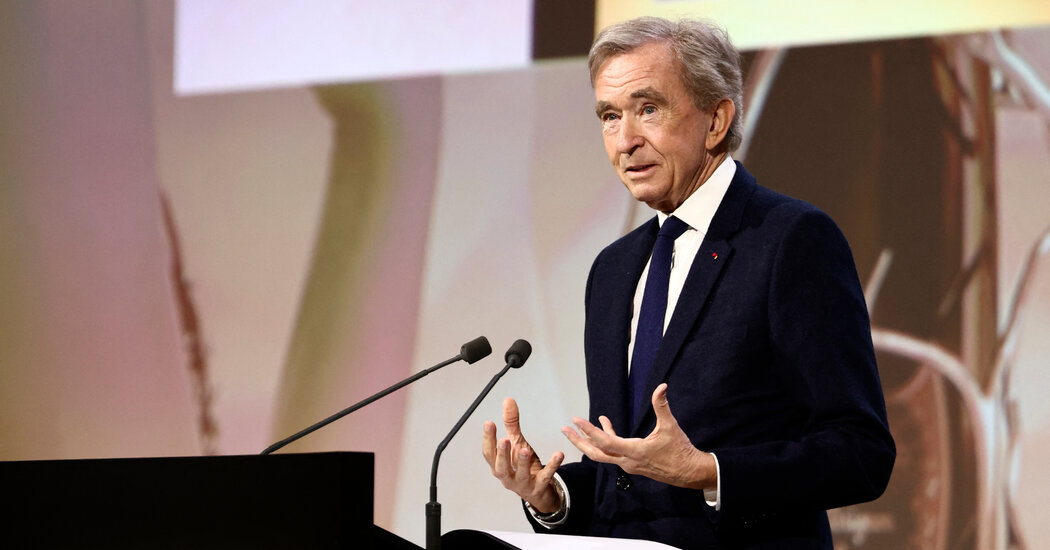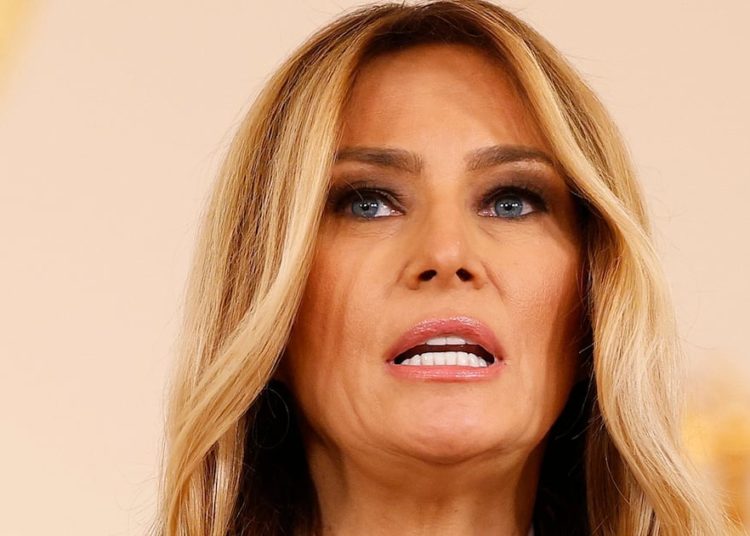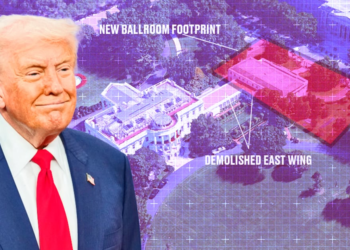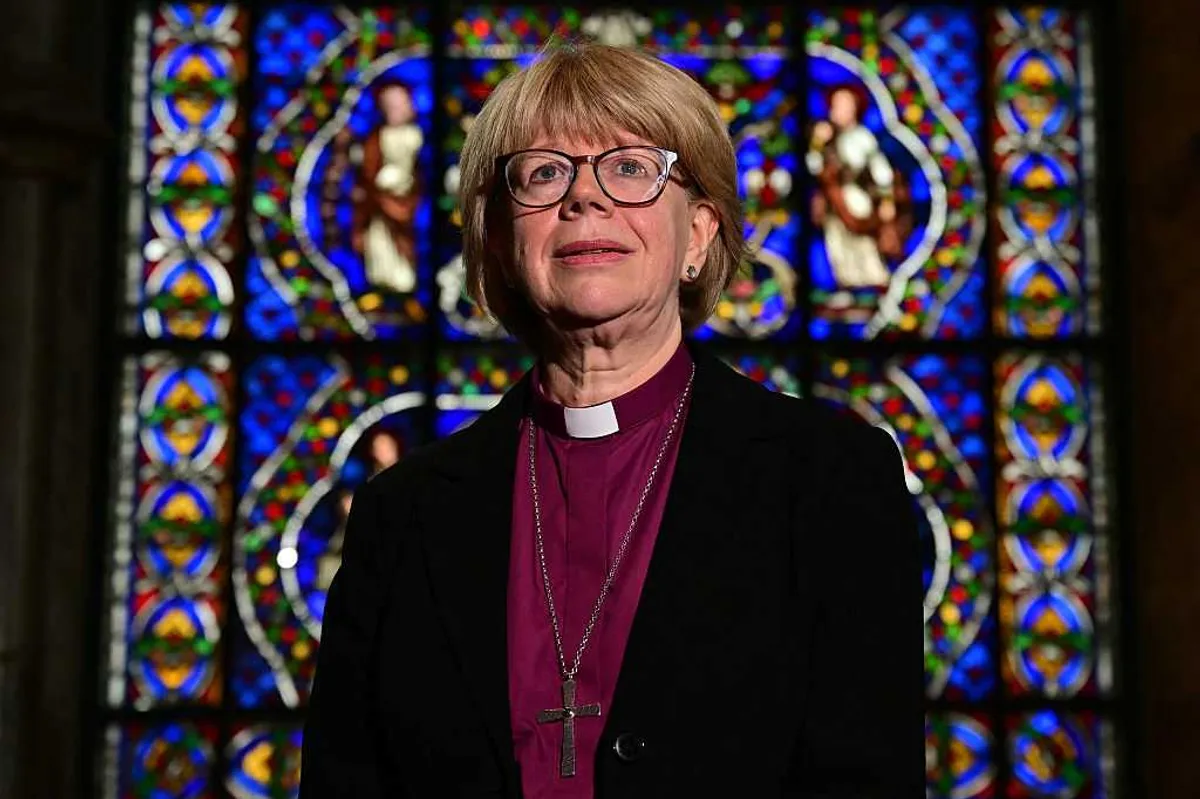For Bernard Arnault, France’s richest man and head of the LVMH Moët Hennessy Louis Vuitton luxury goods empire, the year started off brightly. His friend President Trump extended a personal invitation to the inauguration on Jan. 20. Consumers in the United States, one of LVMH’s biggest markets, were snapping up the company’s Dior dresses and Tiffany jewelry.
Then came Mr. Trump’s tariffs — and a substantial plunge in the company’s share price.
“Until the end of February, everything was going very well,” Mr. Arnault told a packed auditorium of anxious shareholders Thursday at the LVMH annual general meeting in the Louvre Museum in Paris. “Then we came up against a global economic geopolitical situation that was turned upside down by potential customs duties.”
Now, he said, it was up to European leaders to resolve the trade war with Mr. Trump “amicably.” Any failure would be “the fault of Brussels,” he added, and would force LVMH to increase U.S. production and “avoid Europe.”
Echoing a suggestion made recently by Elon Musk, one of Mr. Trump’s chief advisers, Mr. Arnault also called on European politicians to press for the creation of a free-trade zone between Europe and the United States.
LVMH is by no means the only global conglomerate to be whipped by Mr. Trump’s effort to rewire global trading. But as the world’s biggest luxury company, with 75 star brands, including Louis Vuitton, Christian Dior, Tiffany and Dom Pérignon Champagne, it has become an industry bellwether.
LVMH stock, which started the year at more than 700 euros a share, has dived 35 percent since Mr. Trump’s first tariff announcement in February. On Tuesday, after LVMH reported a 3 percent decline in first-quarter global sales as the tariff threat slowed growth in the United States and China, its shares slumped another 8 percent, weighing down the entire luxury sector.
The plunge has knocked LVMH from its throne as the largest company by market capitalization in France’s CAC 40 index, while the title of the most valuable luxury company in the world went to Hermès, its chief rival.
As the company grapples with “uncharted territory,” Mr. Arnault said that LVMH could consider increasing prices in the United States to make up for the tariffs on a case-by-case basis.
By contrast, Hermès, which sells ultra-high-end luxury products, announced Thursday that it would fully shift the cost of tariffs for all its goods, including Kelly and Birkin handbags and Hermès scarves, to its wealthy American clientele, starting May 1.
LVMH is in a trickier situation. Although a huge portion of its customer base is made up of high-wealth individuals for whom a few thousand extra dollars does not mean much, the group had cultivated growing ranks of so-called aspirational consumers through a range of less expensive products, like perfumes and key chains.
Now, tariffs risk pushing up inflation, Mr. Arnault said, a shift that could cause those customers to pull back on spending. Higher inflation could, in turn, trigger higher interest rates, another phenomenon that would hurt consumers, he said.
Mr. Arnault declined to answer questions about whether he had spoken directly with Mr. Trump. But in France, speculation has run rampant that he might have Mr. Trump’s ear, especially after the French billionaire was seated along with his wife and two of his adult children just behind former presidents Barack Obama and Joseph R. Biden Jr. at the inauguration.
One of Mr. Arnault’s sons, Alexandre Arnault, had run Tiffany in New York, including a flagship store in Trump Tower, and had grown close to Ivanka Trump and Jared Kushner, Mr. Trump’s daughter and son-in-law, who traveled to Paris before the inauguration to get fitted for a Dior gown and a Givenchy suit. Mr. Trump hosted Alexandre Arnault at Mar-a-Lago last year, calling him “a young man on the move.”
And yet, in the Louvre on Thursday, the elder Mr. Arnault recounted how he had found himself spending countless hours with LVMH’s management teams, including his five adult children, who all have leadership posts, strategizing about how to navigate the tariff minefield.
The company has set aside a 10.5 billion euro cash cushion. Recently, it began stockpiling Champagne, wine and spirits shipped to the United States.
LVMH has three Louis Vuitton factories in the United States, including one that Mr. Arnault opened in 2017 in Texas alongside Mr. Trump, who flew the French billionaire on Air Force One to the ribbon-cutting ceremony. Those facilities, as well as Tiffany workshops in the United States, could increase production in the event of prolonged tariffs, Mr. Arnault said, adding he might open more factories there if needed.
But the main question, Mr. Arnault said, was whether to offer a wider range of luxury products to aspirational customers or to focus on pure luxury.
In the end, he said, a decision was made to “categorically refuse trivializing” its goods — in other words, to not go down market. Instead, he said, “the goal is to offer the best quality.”
“Maybe we’ll see a little less growth” in the short term, Mr. Arnault said. “But that doesn’t bother me at all.”
Liz Alderman is the chief European business correspondent, writing about economic, social and policy developments around Europe.
The post France’s Richest Man Counted Trump as a Friend. He Still Faces Tariffs. appeared first on New York Times.




